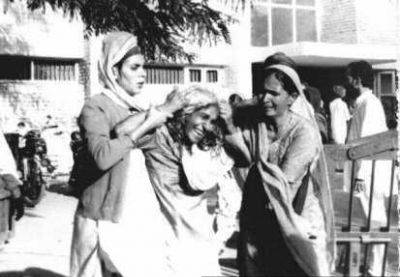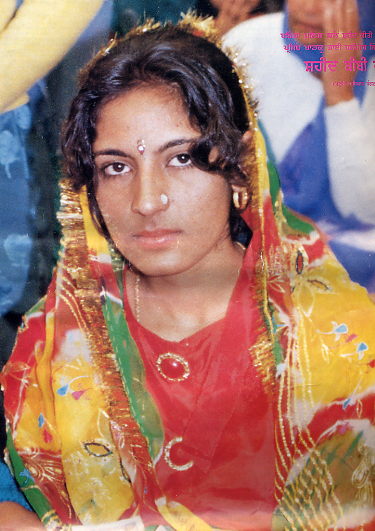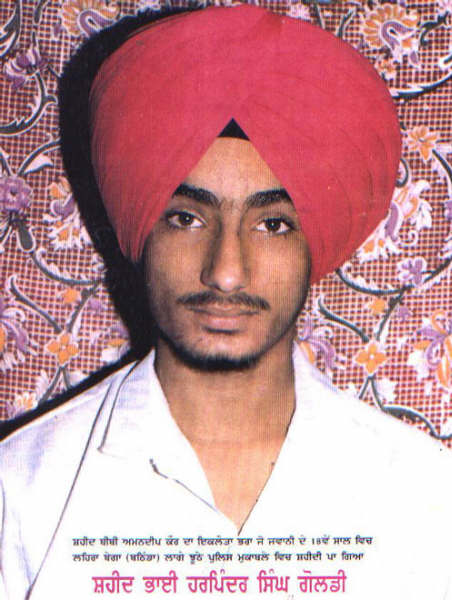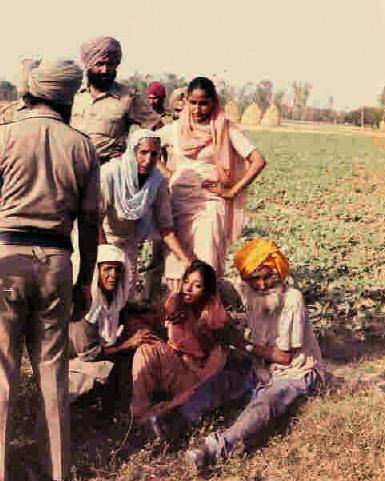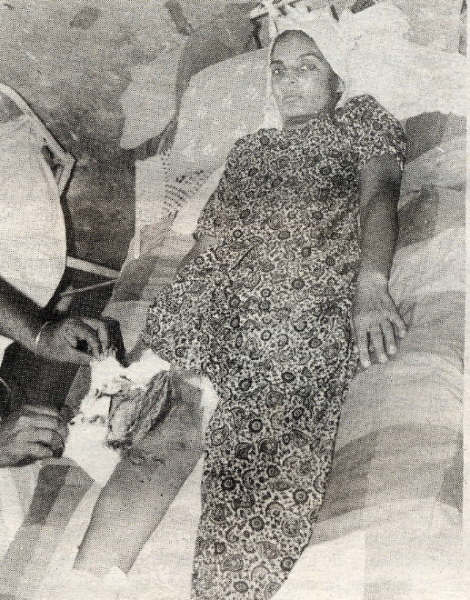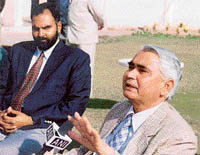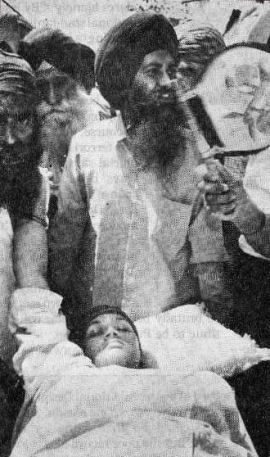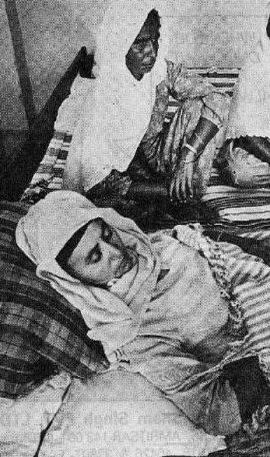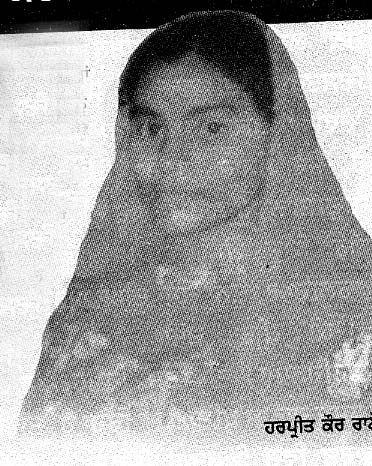

Human Rights
|
Atrocities On Sikh Women In Punjab By Balpreet Singh
"If any action occurs in this village, every single male is going to be taken out and shot. Then we're going to take all the women to our camp and there we're going to create a new breed for Punjab." Brig. RP Sinha addressing assembled Sikh villagers on March 8, 1991, International Women's Day And this was the way International Women's Day was celebrated in Punjab. The untold story of the Sikh Resistance Movement is the story of Sikh women. It is a feature of Punjabi culture that atrocities on women are rarely reported and remain hidden. Families feel ashamed to speak of the treatment women received at the hands of Indian Security Forces, but this story must be told. Role Of Sikh Women In The Movement Many Sikh women participated in the Sikh resistance movement as fighters. Like their sisters from past ages, Sikh women joined their brothers in the fight for freedom. Many brave Singhnee's fought side by side with their Singh's and attained Shaheedi. The examples of Shaheed Bhai Harvinderjit Singh Taini Babbar and Bibi Manjeet Kaur Babbar, Bhai Pritpal Singh and Bibi Harjeet Kaur, etc, are notable. Sikh women often worked as messengers for Sikh Resistance groups as well as preparing hideouts and serving tired Sikh fighters. But unfortunately, many Sikh women were also the target of the bloody thirsty Indian Security forces. Sikh women were ruthlessly tortured, not only physically but also mentally. They were used as tools to force the surrender of Sikh fighters who were their relatives and also as a means of humiliating families. When Sikh women were arrested with their husbands, the husbands were often forced to watch the rape of their wives. Rape was used as an interrogation tool.
The Indian Forces also began a program of 'shudhee karan', which was a code name for the rape of Sikh women. They joked that the offspring of their rapes would change the genetic makeup of the Sikh community and they would kill the Resistance in this way. Many rape victims took their own lives, unable to live with the ongoing humiliation at the hands of the Indian police. The first example of the atrocities heaped upon Sikh women is that of Bibi Amandeep Kaur. Shaheed Bibi Amandeep Kaur
Bibi Amandeep Kaur was the sister of Bhai Harpinder Singh Goldy aka. Pamma of the Khalistan Commando Force. She was only twenty when she was arrested, tortured, raped and then killed by the Punjab Police. Bibi Amandeep Kaur, before her Shaheedi was on the run but had the courage to tell her story to human rights workers. Here is her story in her own words, shortly before she was murdered, I have divided the sections for easier reading: Marriage & Arrest "Jaswinder Singh Sraa son of Surjeet Singh of Jassowal village Ludhiana dst. Was born and brought up on the UK. He presently lives in Mississauga Canada. He came to India on October 12, 1991 for marriage on October 24th. We along with my father Jaswant Singh, village Headman Bhag Singh and Member of Panchyaat Meet Singh went to the office of the sub-registrar, Rampura Phul, for registration of the marriage. As we came out of the courtroom, the SHO of Phul, picked up three of us, me, my husband and my father. We were taken to Phul Police Station where SSP Kahlon, SP Mohkam Singh, DSP Aulah and SP of Operations were present. Inhuman Torture The SSP on seeing us, promptly ordered that my two male relations be stripped naked in my presence. He then took out the picture of his slain son and addressing them remarked that he had taken the revenge for the murder (by dishonouring me, the sister of an underground Sikh activist). Kahlon then started abusing my husband and father. He took hold of a lathi to beat the two. It was then the turn of his subordinates who beat us with their leather belts. The SSP ordered that my husband and father slap each other. After this cruel exercise, we were blindfolded. I was relieved of my two wedding rings, a pair of ear-rings and one golden chain. From my husband, the SSP snatched $500 and a bracelet of 3.5 tolas and his wedding ring. My father was similarly robbed of Rs. 2500. I and my husband were put into our van PCL-8433. We heard the SSP directing his staff to set our house on fire and bring the wife and younger daughter of Jaswant Singh (my mother and sister) to the police station for similar treatment. After Kahlon left, we were brought back to the police station. While my husband and father were put in the lock-up, I was kept out for maltreatment [i.e. for sexual assault]. Early next morning we three were taken to Sardulgarh by our van. On October 27, my mother Surjeet Kaur was brought to us. She told us her story of dishonour [rape], torture and maltreatment. She was kept in a Rampura police station and at the head office of CIA Bathinda. In our absence, the police from Rampura Phul ransacked our house and removed all our belongings. The village panchayat was not let anywhere near the house. No seizure report was prepared and handed over to the panchayat or anyone else.
12 Days Of Terror I, my mother and father were kept in Sardulgarh police station for 12 days. But my husband was moved to Phul police station on October 29. The SSP was present there. He ordered my husband's release on October 30, telling him to forget about his marriage to me and leave India immediately, which he did the next day. In the meantime, the village panchayat came to know of our detention at Sardulgarh and they came there to rescue us but we were removed stealthily to Boha police station. At Boha, I was not given even water for washing under SSP's order. We were maltreated there [the woman was reluctant to give details of the mistreatment]. After eight days, the three of us were removed from Boha to CIA Bathinda. My mother and I were released from three weeks of illegal detention. My father was kept in CIA Bathinda and at Phul and was produced in a court on November 30. A case was registered against him. KP Gill "Helpless" While we were in custody, Jaswinder Singh, who happens to be brother of my father, telephoned DGP KP Gill at telephone No. 753-546840 requesting him to intervene but Gill told him that Kahlon did not listen to his advice. We have learnt that the SSP had picked us up because on October 23, 1991, some millitants had abducted six traders of Phul and the police suspected my 16-year-old brother Harpinder Singh Goldy aka. Pamma's hand in the abduction. My brother had gone underground in the wake of police harassment in August 1991 when he was studying in class 10 + 1. I have gone underground to escape further humiliation and torture because the SSP Harkishan Kahlon is after me, for unknown reasons. Because of the "treatment" given to my husband, he has left me and does not wish to keep me as his wife any longer." Shaheedi Bibi Amandeep Kaur stayed in hiding until January 21 1992. The police then played a sinister game. They asked he to return to her house, returning all her property and insisted they would not harass her any more. They also bailed her father the day before. Jaswant Singh did not trust the police so he did not return home. Amandeep Kaur did. When her mother was out, two gun men with masked faces came on behalf of SSP Bathinda, Kahlon, and shot Bibi Amandeep Kaur dead on January 21st at 7:30pm.
Bhai Harpinder Singh Gold, brother of Bibi Amandeep Kaur, at age 18, also later sacrificed his life for the cause of Sikh freedom. The Story Of Bibi Gurmeet Kaur Bibi Gurmeet Kaur was a student of the 10 grade at village Lehrkaa near Kathoo Nangal. Bibi Gurmeet Kaur and her older sister Bibi Parmjeet Kaur had gone to visit their father Swarn Singh and brother Satnam Singh who were in prison for giving shelter to Sikh Resistance fighters. They had returned home on April 21, 1989 when the Indian police raided their home and arrested Bibi Parmjeet Kaur. The police told villagers that the Deputy Commissioner wanted to record her statement. Parmjeet Kaur was kept in custody one night and then returned home. Next Gurmeet Kaur was arrested and kept for two nights. She too was released but threatened with dire circumstances if she told what had happened to her. Gurmeet Kaur did not remain silent and recounted what had happened to her. When Gurmeet Kaur was brought to the police station, she was stripped naked and tortured in the veranda of the police station in plain view of all the police officers. That night, the police blindfolded her and locked her in a room. In that room, drunken Indian Police officers took turns raping her. Gurmeet Kaur fell unconscious and when she woke the next morning, she found herself covered in blood and stark naked. The next day, Gurmeet Kaur was tortured again. The perverse and twisted police officers went so far as to put salt and chilli peppers into Gurmeet Kaur's private parts. On April 24, when Gurmeet Kaur was released, she could not walk. She was taken to hospital for treatment by the villagers.
Other Cases These cases are not unique. Gang Rapes and humiliation were common in Punjab. 19 year old Baljeet Kaur, sister of Sikh fighter Bhai Gurjeet Singh was also gang raped. Bibi Rachhpal Kaur was arrested for no reason but for having caught the eye of the police party and On September 5, 1989 was gang raped by the Kali Das Sharma and other police officers.
The story of the treatment of Sikh women at the hands of Indian Security Forces is a long and sad one. I don’t know which cases to highlight and which to leave. Should I write about Sarbjit Kaur (14) and Salwinder Kaur (13) who were abducted while collecting clay for a school project and then gang raped and killed by Indian Police? Or should I write about the seven-year-old daughter of a Singh who was molested and then dismembered by the Police’s Poohla Nang? The list is endless. The abuse of Sikh women was and is widespread in Punjab. Mothers, wives and children of Sikh fighters were considered legitimate targets. The butchers who were responsible for these tragedies are still in the police force today. They are now high ranking officers. And the abuse continues… “Now Get Your Khalistan…”
Bhai Nirvair Singh was the Granthi of Gurdwara Shaheedaa(n), Amritsar. Bhai Nirvair Singh’s younger brother, Bhai Kulwant Singh was a Sikh Resistance Fighter and the police constantly raided their home in search of him. Finally, unable to locate Kulwant Singh, SSP Azhar Alam and his “Black Cats” shot Bhai Nirvair Singh to death. Bhai Nirvair Singh’s wife, Bibi Manjit Kaur, was with him at the time and ran to save herself. The police caught Bibi Manjit Kaur and badly beat her with their rifle butts. They let her live, but her ordeal was far from over. On May 5, 1988, the police again raided the house. Bhai Nirvair Singh’s youngest brother, Bhai Dilbagh Singh, a Granthi at Gurdwara Baba Bakala, was home but hid himself, fearing for his life. The police spotted him and without any warning, shot him dead. Bibi Manjit Kaur was still in the house when the police entered and they immediately began to beat her. They grabbed her by her hair and dragged her to the fields where the Indian Police tortured her for an hour and a half. When Bibi Manjit Kaur was almost senseless, they threw her on top of Bhai Dilbagh Singh’s dead body and laughed, “Now get your Khalistan…”. Bibi Manjit Kaur’s feet were so swollen from the torture that she could not walk for days. Her scalp also oozed blood from the repeated blows. Villagers who were witness to this scene were also beaten and told to keep their mouths shut. Harassment of their family and relatives continued.
Today, Azhar Alam is a high ranking official in the Vigilance Bureau of the Punjab Police. The man responsible for the brutal torture of thousands of innocent Sikh men and women has not been charged with any crime. Bibi Gurdev Kaur & Bibi Gurmeet Kaur
Perhaps the most brutal of all Indian Police officials in Punjab was Batala’s Gobind Ram. Gobind Ram took sadistic pleasure in personally torturing Sikh prisoners and kept a vat filled with feces and urine that he force-fed to amritdhari Sikhs while saying, “You have drunk the amrit of Gobind Singh, now drink the amrit of Gobind Ram.” Gobind Ram’s atrocities came to light nationwide when he ordered the arrest of Bibi Gurdev Kaur (wife of Bhai Kulwant Singh Babbar) and Bibi Gurmeet Kaur (wife of Bhai Mehal Singh). Both Singhs were underground at the time. On August 21, 1989, a van with tinted windows came and parked in front of the Parbhat Finance Company, Amritsar, where both Singhnees worked. Six armed men got out of the van and approached Bibi Gurmeet Kaur and Bibi Gurdev Kaur, ordering them to get in the van. When the Bibis demanded to know who they were, one man identified himself as Lakhwinder Lakha, ASI. He said that the police party had come from Batala Sadr police station and they would have to come with him. When the Singhnees began to make a scene, the police threw them into the van. Bibi Gurmeet Kaur and Bibi Gurdev Kaur’s dastaars were ripped off and used to tie their arms and their kirpans were also taken off. The van arrived at the notorious Beco Torture Centre in Batala at 7pm. When the Singhnees went inside, they saw SSP Gobind Ram beating a Sikh youth with a rod. When he saw the two women enter, he immediately came towards them and hit Gurdev Kaur in the stomach with his rod. Bibi Gurdev Kaur collapsed onto the ground and began to bleed from her private parts. The bleeding did not stop for several days. Gobind Ram kept hitting Bibi Gurdev Kaur in the stomach without saying a word for five minutes. He then gave the rod to another Inspector whom he ordered to hit Bibi Gurdev Kaur in the joints. Gobind Ram next moved to Bibi Gurmeet Kaur whom he threw to the ground and began to kick in the chest. The next torture to begin was the “ghotna” where a heavy log is rolled on the thighs with men standing on top, which results in ripped muscles. In Bibi Gurdev Kaur’s own words, “Then they put a heavy roller on my thighs and made a few policemen stand on it, while others rotated it. I kept on screaming but they hit me with belts and kept on asking me the whereabouts of my husband Kulwant Singh.” Both women were severely tortured for two days. Gobind Ram kept demanding to know where Bhai Kulwant Singh and Bhai Mehal Singh were. The Bibis kept repeating that they did not know, but Gobind Ram was not satisfied. They were tortured until they fell unconscious. They were then revived and tortured again. When Bibi Gurdev Kaur was nearing her death, the police secretly took her to the government hospital and left her there. Gurmeet Kaur's right leg was paralysed and both Singhnees had been kept awake since their arrest. Someone was called from the outside to massage their limbs so they could regain some sensation again. Both women could not walk but were forced to do so. In the hospital, a merciful lady doctor took care of Gurdev Kaur and also informed her family. News of all this reached the media and all political religious and social organizations condemned Gobind Ram's actions. When finally Gurmeet Kaur refused to hand over any Singh, she was threatened with being killed. By now though, because the press had gotten wind of the arrest, she was indicted in a false case and sent to jail. After some time, she too was released. Because Bibi Gurdev Kaur received the best care possible, she was saved from death, but for the rest of her life she would face health problems. Human Rights organizations condemned Gobind Ram for his brutal treatment of these two women. He claimed that no torture had occurred and both were kept in a “Guest House”. KP Gill, the Director General of Punjab Police announced, “the reports against SSP Batala, Gobind Ram by members of Panchyats and Sarpanches (community leaders) were false. There is no truth in them. This was propoganda against the police officers. This was verified after investigations. There were such reports against other honest and hardworking police officers (as well)”
When no action was taken against Gobind Ram, and he continued to torture and maim at will, the Singhs took it upon themselves to finish this rabid dog. Gobind Ram was killed on January 10, 1990 in a massive bombing. KP Gill: Super Cop or Sexual Predator?
KP Gill, ex-Director General of Punjab Police, is thought to have single handily crushed the Khalistan movement in Punjab. He has been given the title of “Super Cop” by Indian media despite having unleashed a wave of terror on the Sikhs that was not even seen in the days of the Mughals. Torture methods were so grotesque and brutal that they cannot be described. Gill was known to the Sikhs of Punjab as a drunk who also preyed on helpless women. Although Gill is proclaimed “Super Cop” in India and considered a great hero, the fact that he has been convicted for sexual assault is usually ignored. In 1988, KP Gill was attending a party to celebrate Operation Black Thunder (an assault on Sree Darbaar Sahib Amrtisar). At this party, in plain view of all attendees, KP Gill sexually assaulted Indian Administrative Service officer Rupen Deol Bajaj. Bajaj was not helpless like most victims and instead of forgetting the incident, filed a police report. Other officals spoke with Bajaj and asked her to withdraw the case since Gill was a hero in the fight against the Sikh Resistance but despite all this, she persisted. According to one report, “The government immediately took sides and tried to squelch or delay the court case. It also took petty action against Ms. Bajaj by making her a low-ranking official, stopping her mail, taking her off of mailing lists, removing her from government telephone books, etc” Finally, in 1996, the butcher of Punjab, KP Gill was convicted of sexual assault. Though he was initially sentenced to three months in prison, the sentence was reduced to three years supervised probation (later further reduced to one year, un-supervised probation). He was also ordered to pay Rupen Deol Bajaj Rs. 2 lakh and pay Rs. 50 000 in legal expenses. If a high ranking officer could not escape being a victim of Gill’s lust, what to say of the thousands of poor Sikh women kept in dark cells without any charges and without any rights? This is the character of India’s hero, KP Gill, “Super Cop” And The Abuse Continues Today… Some argue that in the turmoil of Punjab, perhaps some excesses were committed but times have changed. The Police have reformed and India now treats Sikhs fairly. A glance at the newspapers is enough to dispel that belief. The following story appeared in the Chandigarh Tribune on September 27, 2003 http://www.tribuneindia.com/2003/20030927/chd.htm Woman Alleges Inhuman Torture By Police. Chandigarh, September 26 2003 An another incident of brutal torture came to light when a 20-year-old girl, Karamjit Kaur, who was rescued by the Warrant Officer of the Punjab and Haryana High Court, today alleged that she was subjected to inhuman treatment and was asked to remove her clothes by the Punjab Police personnel at a press conference organised by the NGO Lawyers for Human Rights International here today. “Five persons including two women, who had been allegedly subjected to third degree torture for several days by the Punjab Police were rescued by the Warrant Officer of the Punjab and Haryana High Court yesterday. These five persons were suspected to be involved in a murder case by the police. The five persons who were released included - Karamjit Kaur, Tirath Kaur, Sahib Singh, Gurdev Singh and Gurmit Singh,” informed Mr Arunjeev Singh Walia, Press Secretary. Showing torture marks on her body, the victim while addressing scribes, said she was detained at Nabha police station for several days and been tortured. She was even ordered to remove her clothes by police constables, the victim alleged. Narrating her tale of woe, she said police constables, after taking liquor usually interrogated her in the midnight. Even if a woman constable was called most of the time she stayed outside the room during her interrogation. The victim further added that: “I can not reveal the details whatever happened to me was worse than a hell.” She further added that “she was subjected to inhuman third degree torture twice by pulling her legs apart in 180 degree and also beaten up with an iron rod in between her legs and two police men putting pressure on that rod. “I was also threatened of liquidation if I did not disclose the truth and was also molested by the policemen", the victim further said. Similarly, her mother said: “It was difficult to see my husband, son and daughter to be subjected to third degree torture by the police.” When contacted the SHO of the police station concerned denied that they were subjected to third degrees torture. He said that all five of them were called at police station only for a day. Thereafter they were not traceable. The General Secretary of the NGO, Mr Navkiran Singh, who had moved a petition in the high court for the release of victims said a Warrant Officer had secured the release five victims from the illegal custody of police station Kotwali, Nabha, Patiala district on September 25. He also informed that the high court had also ordered the medical examination of the victims. The Chairman of the NGO, Mr Amar Singh Chahal, demanded a CBI inquiry into the case. How many cases continue to go unreported? The Khalsa once saved thousands of abducted Hindu women from being molested and sold by the Afghans. Why can't we even save our own now? Our sisters continue to suffer in Punjab. And the Panth continues its long slumber…
A discussion on the atrocities Sikh women suffered in Punjab would not be complete without a discussion on what Sikh widows and their children continue to endure today. They have been forgotten by most in the Panth. Those Singhs that sacrificed their lives for the Sikh Cause must have thought that the Panth would take care of their families after they had been martyred. Sadly, this has not happened. And now, many say that no future generation will be willing to make the same sacrifices seeing the way families that were left behind in this chapter of the Sikh struggle continue to be neglected and live in poverty. 15-Year-Old Harpreet Kaur
By mid-1992, the Indian Police in Punjab had lost all sense of morality and considered human rights to be a joke. On June 25, 1992, 15-year-old Harpreet Kaur Rano was stopped while riding her bicycle in Amritsar’s Ghio Mandi. Harpreet Kaur was very interested in the Sikh struggle and used to consider the Sikh fighters her brothers. When the newspaper would print a notice about the Shaheedi and bhog of a Sikh fighter, she would cut out their picture and keep it in her purse. The police decided to search her purse. When the pictures were found, the excuse to arrest this young Sikh girl was found and she was taken directly to the famous torture center at BR Model School in Amritsar. She was put in the custody of Thanedar Darshan Lal who punished Harpreet Kaur for her “crime”. In that dark torture center, only Vahiguru knows what suffering and brutality Harpreet Kaur faced. Despite her family’s best efforts to free her, the newspapers reported that Harpreet Kaur along with 3 other “terrorists” had been killed on June 27, 1992 near Sultanvind. Her body was not given to the family. The family went to the cremation grounds at Durgiana Mandir and in one pile of ashes, Harpreet Kaur’s sister recognized a kaRa. The two sisters used to wear identical KaRas and the ashes were recognized as Harpreet Kaur’s. No justice was ever expected or delivered for this cold-blooded murder. Final Wish…
Bibi Kulbir Kaur Dhami was kept in illegal custody by the Tarn Taran CIA staff for many months from 1993 to 1994. Miraculously, she survived. During that time she saw countless Singhs and Singhnees be tortured and then killed in fake encounters. In her own words, Bibi Kulbir Kaur recounts the final wish of one Bibi who was being taken to her death: “Surinder Kaur was the principal of a Model School in Tarn Taran. Her school had approximately 400 children enrolled. Her husband was a former soldier and worked in a bank in Amritsar. It was perhaps July 1993 when he was arrested along with his wife and children and brought to the jail for having given shelter [to Sikh fighters]. With her was the son of a Pandit, Ramesh, who had become a Singh and had been arrested with his group [of fighters]. This group was tortured in front of us. They endured this cruelty for about a week and most of the group confessed to having participated in some actions, but this couple, [Bibi Surinder Kaur and her husband] were accused of having given the group shelter only. Surinder Kaur kept begging that her body not be touched by any male police officer. She was kept with me for eight days in the women’s lockup. In front of me, she was interrogated four times a day. The male police officers would beat her with sticks and use the ghotna. Three or four policemen would stand on the ghotna. I myself saw them drag her around by the chest. This entire interrogation was conducted by SP Operation Khoobi Ram, DSP Gurmit Singh, Inspetor Ram Nath, and SI Tarlochan Singh. They are completely responsible for torturing and killing her (it’s another story that their orders were all coming from the top). Four members of this group, along with Surinder Kaur’s husband were tortured for a week and then killed in a fake encounter which was reported to then newspapers. One of those was a police officer, Dalbir Singh, who had abandoned his job, but he was apparently spared. All this [the encounter] happened in front of him and he could be a witness. At around 8pm, the police took Surinder Kaur away from me while beating her. Surinder Kaur was dragged away as she wept and called out my name. They threw her in a car. She was sobbing and screaming her final wish to me, “You have to take care of my child now…look after him…this is your responsibility now.” Surinder Kaur was killed that night. The police officials told me that she cried the entire time in the car and they told her to do paath after which they shot her. When she died, Surinder Kaur was wearing my suit and the police officials teased me that because my suit had gone in my place, I had been spared.” Bibi Kulbir Kaur Dhami now runs the Gur Asra Trust for Sikh orphans in Mohali. Widow Of A “Terrorist” The widows of Sikh “terrorists” have suffered terribly in the years since 1993. Widows like 18-year old Jasvir Kaur, who had been married to Sukhdev Singh Sukha of Babbar Khalsa International were forced by their poverty to marry much older men. Many began to do menial work to make ends meet. The following interview appeared in “The Week”, a well known Indian Magazine on April 19, 1998. Bibi Jasmeet Kaur is a Sikh hero. She was married to Bhai Satnam Singh Chheena of the Bhindranvala Tiger Force and was involved in the punishing of Comrade Hardev, a depraved police tout who was known to rape and kill with impunity.
INTERVIEW: JASMEET KAUR, WIDOW OF A TERRORIST 'We feel abandoned by the community' Jasmeet Kaur was widowed two years after she married Satnam Singh Chheena of the Bhindranwale Tigers Force of Khalistan in 1991. She lived underground for years, bore his two children while in hiding and is being tried in murder case. She is active in the Gur Aasra project. Excerpts from an interview: How have people treated the families of militants after terrorism ended? People started looking at us with suspicion and hatred. They blamed the terrorists and their families for the harassment by the police. They felt we women could have corrected our husbands. The behaviour of the in-laws was the worst. My parents cooperated with me. So I didn't have many problems. Yes, I had financial difficulties, and worked for the Shiromani Gurdwara Prabandhak Committee. I did feel orphaned, worried and insecure. Do you wish the bloody years had not happened? I cannot regret those years. What has happened cannot be wished away. Today, I have two sons, six and five years. It is difficult to raise them alone. I would prefer not to discuss their whereabouts. Does being the sons of Chheena affect them? I have not told them anything. When they ask me, I tell them their father is in the village. How do I explain things to them? My children don't know that their father was a militant though they know his real name. I don't want them to know about him now. I just want them to become responsible citizens and that the society gives them the same respect and dignity as others get. Any Akali faction with you? No one is with us now, not even (Simranjeet Singh) Mann. He probably feels that if he speaks up for us, he will never win an election. It is a matter of politics. We do feel abandoned by the community. How was the scene when your husband was around? When the movement was on, we were all respected, especially if our intentions were clear. I was a proclaimed offender (PO) even before I got married. While in Khalsa College, Amritsar, I was annoyed at the attack on the Golden Temple. My links with the militant movement grew as did my desire for revenge. I was in the AISSF and then with the BTFK. I was involved in the murder of Comrade Hardev Singh, and was in jail for a year, in Amritsar. After marriage I became PO again and was arrested and later bailed out. In 1995, I was arrested in Gurdaspur, where there was a case against me. The police would have hounded every family I stayed with. So till January 1996 I was in jail and when I was released, I decided not to be a PO because I had children to raise. I decided to attend the court hearings and to work. I can't say I returned to the mainstream, but can't even say I have given up the movement...that is in my blood by now. It is another matter that I have decided not to lift a gun, but will fight politically. Now this itself is a fight to collect all these people under one roof. People ask us why we are here, and we tell them. That is also part of the fight. What problems did you face in raising your sons? It was very difficult to get birth certificates for my children. All of us women underground used to get admitted under fake names in hospitals. But I arranged it somehow. I cannot count how many children were born underground, but many were. Kulbir Kaur Dhami's child was born in the jail. We also did not not tell the schools that the child's father was a terrorist? Any emotional disturbances among the children? Plenty. Call any child and discuss it, and we will have a tough time consoling them. These kids have seen their fathers being dragged away by the hair. They often get up in the middle of their sleep, screaming "hai mere pappa ko maar diya". They are all small kids who have seen raw violence. So we try not to remind them of it. Most of the small children have not been told that their fathers are dead. Now some of the older ones are learning from their elders. We cannot hide it for all times. They miss their fathers, but they are not old enough to realise that. They don't know of terrorists. The elder ones have some idea, which they don't want to talk about. Even if we want to talk to them, explain and correct the picture, they say that we are wrong...that they have seen their fathers fighting for dharam. Why then should we create a bad picture of our husbands in their minds? Do the children know about Khalistan, what it was all about? No. We will tell them clearly what it was all about when they grow up. If we tell them now, we don't know how it will affect them. We want them to be involved in constructive work so that they forget their old trauma. We want them to study, play and be happy. This is the text of the article in "The Week" that the interview was taken from. Terrorists' children
Society: Left to fend for themselves by an indifferent populace and government, they gaze at the future, trying to cast off the past Little Manjit tasted vegetables for the first time in his life a year ago, in March. It was also the day he saw the world outside a gurdwara.Manjit, aged five, is nobody's child, like the many young ones of Punjab whose fathers were shot as terrorists. Some of them were born posthumous, many were delivered underground, and a few had their umbilical cord cut inside jail. Life is no rejoicing for the children and wives of militants who met with violent death during the 12-year civil war in the state. Smiles are rare at Gur Aasra, a modest home for them at Mohali. The mood here is melancholy. "But they have never been happier in a long, long time," said Kulbir Kaur Dhami, who is in charge of the small, plain house crammed with three-tier beds. Her own child was born in jail before she was acquitted in a TADA case; her husband, Kanwar Singh Dhami who made an about-turn at a surrender ceremony and swore by Khalistan, is serving a 14-year sentence. Wives and children of militants, dead or alive, commanded respect in the days of bombs and Kalashnikov rifles in Punjab. When the security forces hunted down the militants many people showed the door to their widowed daughters-in-law and grandchildren, mainly to make peace with the police. They found no shelter except in gurdwaras. Many of these women were too proud to live off the gurdwaras for ever. Besides, they wanted the children to go to school instead of running around barefoot in the gurdwara. They had several meetings to chalk out a plan for their future but every meeting ended in a group of squabbling women going their own way. "These are women who had stood up and done what they wanted to. Many of them had huge egos too," said Jaspal Singh Dhillon, chairman of the Human Rights and Democracy Forum, who eventually persuaded a few of them to join hands. Thus was born Gur Aasra (meaning 'at Guru's mercy'), where a handful of women mother 28 terrorists' children. As one enters the home one is assailed by cold or suspicious stares. "What is your name," I ask a little girl. "Pradeep Kaur," says the three-year-old, the youngest around. "And your brother's?" I ask pointing to the boy near her. "She is a girl," intervenes Kulbir Kaur. The girl in shirt and trousers has her hair tied like Sikh boys, one of the women wants the girls' hair done that way "to avoid trouble". Trouble they have had of a lifetime, and the tremors of fear inside them broke out as bed-wetting and sleepwalking in the initial days at Gur Aasra. They have not completely overcome the trauma: many of the children remember the deathly scenes they saw but few know what their fathers fought for or why they were gunned down. One evening when Kulbir Kaur's CRPF security men (provided by court) came to Gur Aasra 16-year-old Gurjit Kaur, the oldest of the children, ran to the rear of the home screaming in terror. Two dozen children ran after her and hid with her in shock and tears. When she was barely nine Gurjit had seen the police lining up the inmates of an orphanage at Anandpur Sahib and bullying them to prise information about their parents. Gurjit eventually learned to talk about such nightmares and cushion the shock but another girl would not talk at all until everyone had spoken to her about their traumatic experiences. "The more she spoke, the more normal she became," Dhillon said. But apparently it is not an easy thing to do. The children are kept occupied, it helps forget the past. The day begins at the crack of dawn with tuitions, which have been a great help for them to get through school entrance tests and do well in class. By the second term, the weakest child was scoring about 75 per cent, and some became toppers. Occasionally the children have school friends as visitors and a few get invited to birthday parties. Those over eight years have an idea of their background; others have not been told that they are orphans or that they are terrorists' children. Gur Aasra had very humble beginnings and it has been a struggle to keep afloat. Three cups and a dhurrie were all it had when it started, and Dhillon paid the first month's rent from his own pocket. "People want to see our work before they give money. But you need money to start with," he said. An empty orphanage in Kharar, which was built for the victims of 1984 riots, had agreed to help the Forum rehabilitate the children; it got the cold feet when it learnt that these were terrorists' children. Every week Gur Aasra has many orphans knocking at its doors, and for want of room the Forum is planning to open similar homes in other districts. Gur Aasra also has a non-residential project which provides assistance to terrorists' children who live with their destitute mothers or distant relatives. Another home for terrorists' children is the Mata Gujri Sahara Trust run by Sohanjit Kaur and Sandip Kaur, both widows of militants, at Kalar Bhaini in Patiala district. Though there are 50 orphans and a few widows there it is disturbingly quiet; the children have given a lifelong holiday to childhood pranks. As a visitor, Karamjit Singh, said, pranks are lovable only when parents can afford to replace broken articles. Having skipped their childhood, the orphans help with the cooking and cleaning, and the widows' dream of opening a school for them has gone unrealised. They simply have no money. The plight of militants' widows is poignant. Mothers of 10 children whom the Forum wanted to put up at the orphanage in Kharar had abandoned their children out of sheer desperation. Those who kept their kids under their wings suffered, too. Surinder Kaur's husband was picked up by the police because his brother Nachattar Singh Shatrana belonged to the Khalistan Commando Force. With her three kids, she fled from the police and lived in various gurdwaras, and she still does not know if her husband is alive. And she is too scared to go back to her house. Maninder Kaur's husband Sarbjit Singh was with the Khalistan Liberation Army; he was killed in February 1992. "People used to come to me for help in all sorts of things earlier, land disputes, petty fights, family disputes and problems in marriage," she said. "They knew we had clout and would use it wisely. We were used by them. After my husband died and militancy was over, they abandoned us. Neither the militant outfit nor the public cared. I worked hard, sewing clothes, doing dishes and the like. I sent off my daughters to Anandpur Sahib because I wanted to spare them the agony." Maninder does not get a pension from the railways where her husband was employed. Nor has she received his gratuity and provident fund. The reason: the police claim that they are not aware of Sarbjit Singh's death! Maninder has another worry: will anyone marry her daughters? For these women and orphans, returning to the mainstream has not been as easy as it was for Chief Minister Parkash Singh Badal to return to mainstream politics. The government has no schemes for their rehabilitation, they are unwanted people. All they have in abundance is a sense of isolation. What Can You Do?
The Sikh widows and children left behind need us. The Singhs that died did their part and it’s now up to us to do ours. We must make sure that those left behind are not suffering and living in poverty. The best thing we can do is to visit these families and help them in the way they need it most. Establishing contact with them directly. Our Brothers and sisters need us now. We have let them down for much too long as it is.
|

